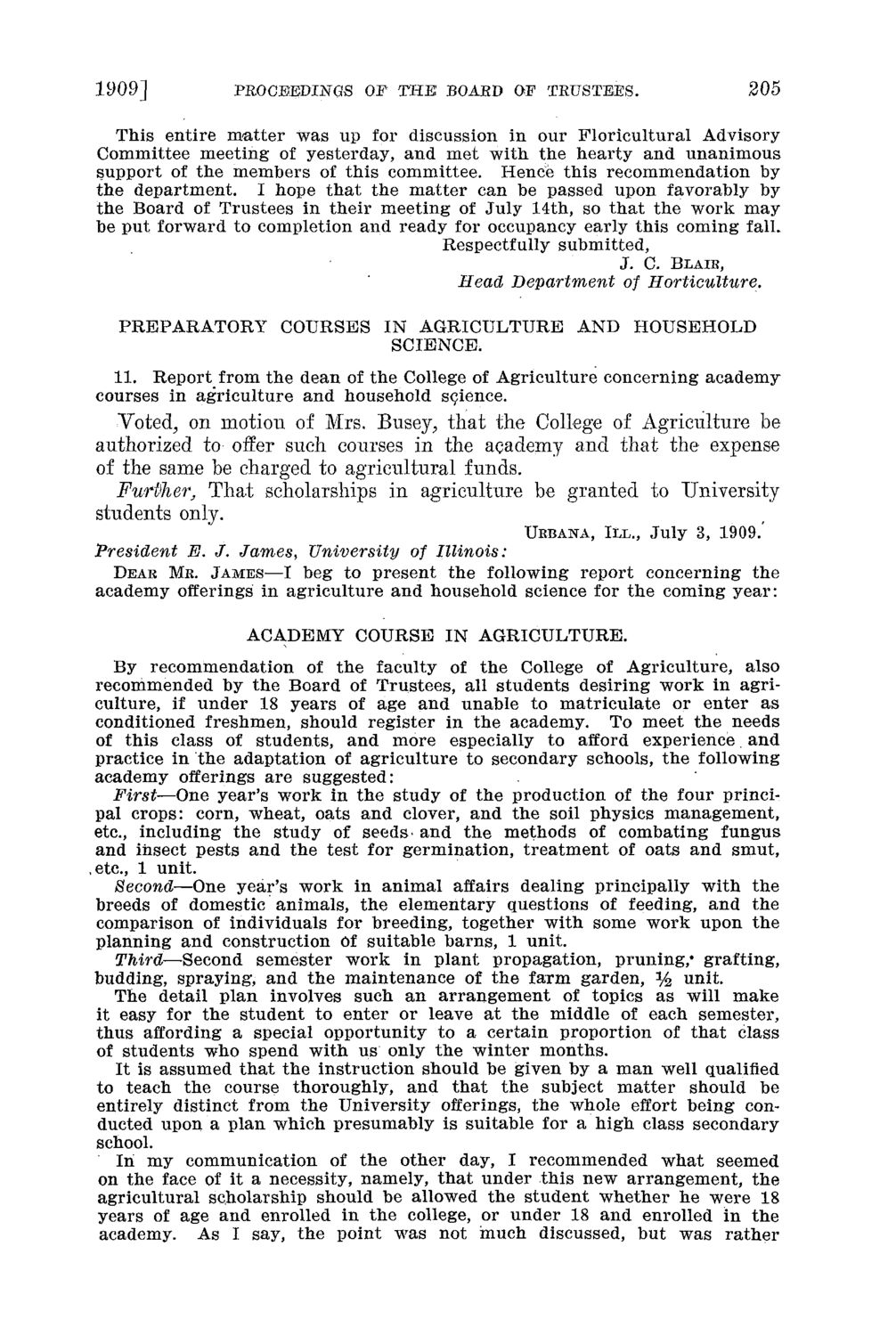| |
| |
Caption: Board of Trustees Minutes - 1910
This is a reduced-resolution page image for fast online browsing.

EXTRACTED TEXT FROM PAGE:
1909] PROCEEDINGS QP THE BOARD OF TRUSTEES. 205 This entire matter was up for discussion in our Floricultural Advisory Committee meeting of yesterday, and met with the hearty and unanimous support of the members of this committee. Hence this recommendation by the department. I hope that the matter can be passed upon favorably by the Board of Trustees in their meeting of July 14th, so that the work may be put forward to completion and ready for occupancy early this coming falL Respectfully submitted, J. C. BLAIB, Head Department of Horticulture. PREPARATORY COURSES IN AGRICULTURE AND HOUSEHOLD SCIENCE. 11. Report from the dean of the College of Agriculture concerning academy courses in agriculture and household science. Voted, on motion of Mrs. Busey, t h a t the College of Agriculture be authorized to- offer such courses in the academy and t h a t the expense of the same be charged to agricultural funds. Further, T h a t scholarships in agriculture be granted to University students only. URBANA, I I I . , July 3, 1909.' President E. J. James, University of Illinois: DEAR MR. JAMES—I beg to present the following report concerning the academy offerings in agriculture and household science for the coming year: ACADEMY COURSE IN AGRICULTURE. By recommendation of the faculty of the College of Agriculture, also recommended by the Board of Trustees, all students desiring work in agriculture, if under 18 years of age and unable to matriculate or enter as conditioned freshmen, should register in the academy. To meet the needs of this class of students, and more especially to afford experience. and practice in the adaptation of agriculture to secondary schools, the following academy offerings are suggested: First—One year's work in the study of the production of the four principal crops: corn, wheat, oats and clover, and the soil physics management, etc., including the study of seeds • and the methods of combating fungus and insect pests and the test for germination, treatment of oats and smut, ,etc, 1 unit. Second—One year's work in animal affairs dealing principally with the breeds of domestic animals, the elementary questions of feeding, and the comparison of individuals for breeding, together with some work upon the planning and construction Of suitable barns, 1 unit. Third—Second semester work in plant propagation, pruning,* grafting, budding, spraying, and the maintenance of the farm garden, y2 unit. The detail plan involves such an arrangement of topics as will make it easy for the student to enter or leave at the middle of each semester, thus affording a special opportunity to a certain proportion of that class of students who spend with us only the winter months. It is assumed that the instruction should be given by a man well qualified to teach the course thoroughly, and that the subject matter should be entirely distinct from the University offerings, the whole effort being conducted upon a plan which presumably is suitable for a high class secondary school. In my communication of the other day, I recommended what seemed on the face of it a necessity, namely, that under this new arrangement, the agricultural scholarship should be allowed the student whether he were 18 years of age and enrolled in the college, or under 18 and enrolled in the academy. As I say, the point was not much discussed, but was rather
| |